SLC | S21W5 : Mini Research for Students
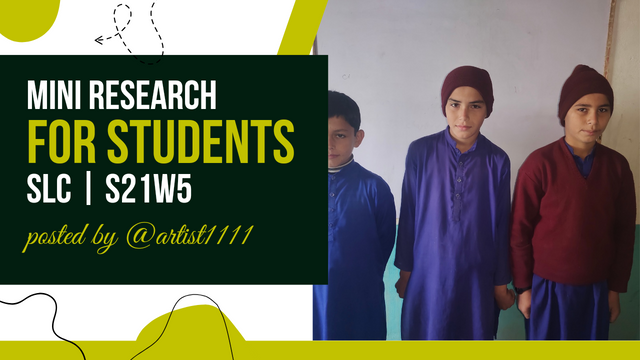
Canvas source I planned two research topics for my students, one for class 5th, and the other for class 7th.
For the class 5th students, I decided to make things a bit fun. We didn't dive into anything too complex; instead, I gave them a test on English essay writing. Yes, you read that right! I thought, why not make them write essays about something they enjoy? After all, the goal is to let them express themselves while still learning important writing skills.
The 7th class students got a more serious topic: the 9/11 incident. Since I am teaching history, I thought it would be really important for them to know how such an event changed the world. Trust me, it is not an easy thing to talk about such a heavy topic in front of young minds, but they did pretty well!
I also opted to do the research with my students. To the 5th graders, it was just about being creative with words, while the 7th graders went about researching the history behind the 9/11 event.
Both of them were able to take in new ideas and have a better chance of polishing their research skills. On my part, I loved guiding them through this journey. They really did me in with their efforts and enthusiasm!
This research is important because it helps students connect with world history in a more meaningful way. It encourages them to investigate the causes and consequences of such a significant event.
They will analyze the global implications of the tragedy, deepening their understanding of international relations, security, and politics.
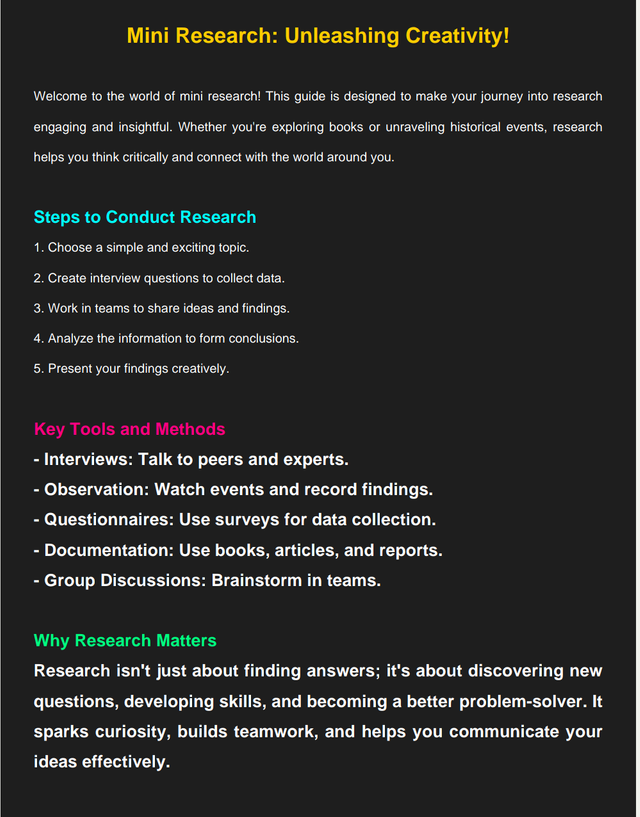 Key points Key points |
|---|
Both topics are designed to require deeper exploration, whether one is writing essays or is analyzing historical events. They will challenge students to think critically about things, ask questions and interact with the world more profoundly.
They will find out how to approach the problem systematically and develop some solutions using proper research techniques.
In the mini research arena, formulating a problem, then developing relevant questions for interviews, is helpful to guide students towards better comprehension of their topic. With that, it helps develop real-world issues in activities on research, thinking and developing critical thinking skills along with the application of scientific methods. In defining problems, students are challenged to see the subject matter in finer perspectives and to come out with insightful answers.
It's important to have interview questions that are clear, focused, and able to assist the researcher in gathering data that directly answers the problem for each research problem. Below are two problems on different subjects, each having its own set of interview questions to guide the process of research.
Research Problem for Class 5th: Essay Writing on "The Importance of Reading Books"
Problem: Many students are not motivated to read books outside of their schoolwork. Understanding why reading books is important and how it benefits children’s overall development is key to motivating them.
Interview Questions:
- Why do you think reading books is important?
- How often do you read books outside of school assignments?
- What type of books do you enjoy reading the most and why?
- Have you ever learned something new from reading a book? Can you share an example?
- Do you think reading books helps improve your writing skills? How?
- What would make reading books more fun and interesting for you?
- If you could recommend a book to your classmates, which one would it be and why?
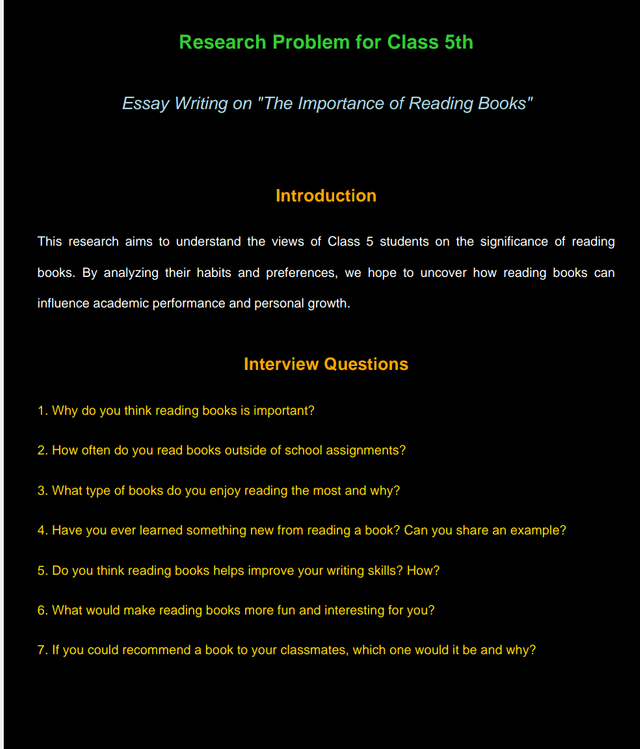 Research paper for class 5th students Research paper for class 5th students |
|---|
Research Problem for Class 7th: Understanding the Impact of the 9/11 Incident on World History
Problem: The 9/11 incident was a turning point in history. Exploring how this tragedy affected global politics, security, and everyday life is important for students to understand its long-lasting consequences.
Interview Questions:
- What do you know about the events of September 11, 2001?
- How do you think the 9/11 incident changed global politics?
- What impact did the 9/11 tragedy have on security measures around the world?
- How did 9/11 affect the lives of ordinary people, both in the U.S. and globally?
- Do you think the media portrayed the 9/11 events accurately? Why or why not?
- In what ways did 9/11 shape the future of international relations?
- Do you believe the world became safer or more vulnerable after 9/11? Why?
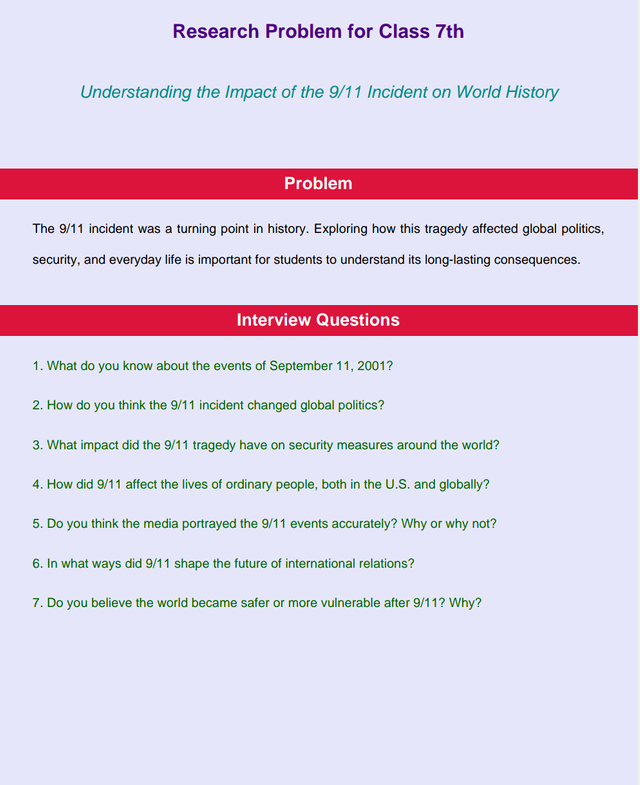 Research paper for class 7th students Research paper for class 7th students |
|---|
By defining these problems and interview questions, students are able to tackle their research projects methodically, acquire valuable information toward solving real-life problems while fostering fundamental skills in communication, analysis, and teamwork.
Yeah, today we conducted some awesome research in the most fascinating way possible! I assigned my students their respective research topics and gave them the prepared interview questions to guide their process. From the moment they started, it was clear this activity would be both engaging and educational.
For the class 5th students, they very enthusiastically jumped into their essay writing research. Each of them brainstormed a unique topic, interviewed their classmate about his reading habits and gathered ideas to improve upon their writing. It is very inspiring to watch them jump with excitement as they are jotting down responses and structuring their essays. They did ask really thoughtful questions, such as "What book do you think every kid should read?" and brought those insights into creative narrative.
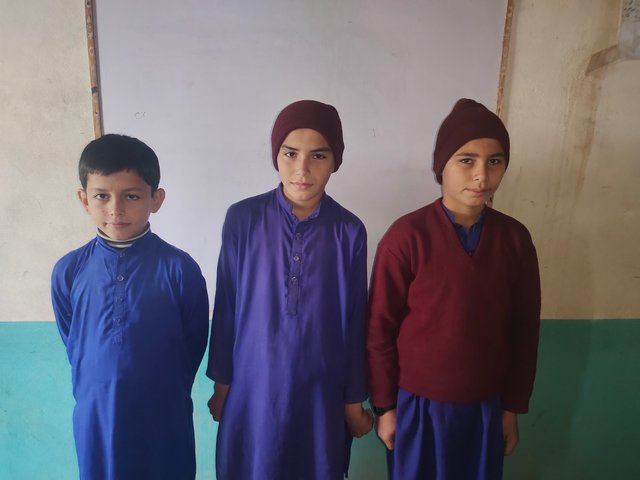 Class 5th students Class 5th students |
|---|
Meanwhile, the class 7th students actually showed some seriousness in researching their chosen topic: the 9/11 incident. Equipped with these prewritten questions, they actually debated about the historical event over in pairs, focusing on global influence. They impressed me that they can relate points in history, politics, and human experiences.
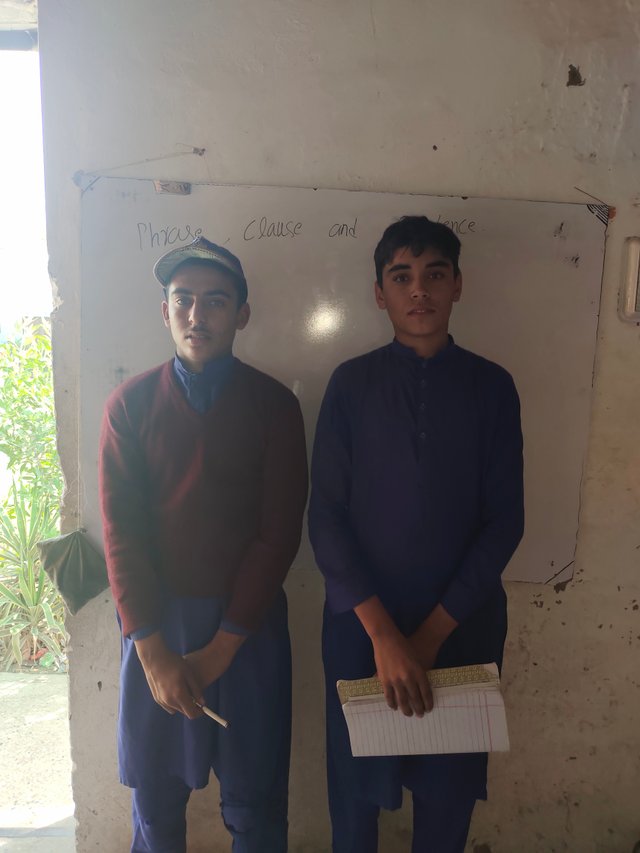 Class 7th students Class 7th students |
|---|
I observed the teamwork by which they recorded responses, how they planned to present their findings, and really how they took ownership of their research. It was marvelous to see them working in teams, showing genuine interest in their topics, and owning up to their work. Some students asked follow-up questions that are not even part of the interview questions. Their creativity and critical thinking are at their best.
At the end of the session, they shared updates of their progress, and I couldn't help but be proud of how engaged and confident they were. It had been a day of learning, exploration, and with a dash of fun!
Today's activities brought about some intriguing findings by reflecting the creativity, curiety, and critical thinking of the students. Groups for both class 5th and class 7th have discovered some exciting researches, which did not only make the session instructive but also interactive.
Class 5th Research: Essay Writing on "The Importance of Reading Books
During their interviews, the students found that most of their classmates preferred comic books and adventure stories over traditional textbooks. It was interesting that some students reported that they do not read much outside schoolwork because they said that books are "too boring" or "not exciting enough." However, if asked about books with illustrations or stories with relatable characters, their interest greatly increased.
Another unexpected finding was how vocally students connected reading to writing skills. They noticed that those who read often could write longer, more detailed essays with fewer mistakes. Some even shared how their favorite stories inspired them to create their own tales during free time.
Conclusion: Reading books enhance writing skills and creativity more than anything. Introducing engaging genres such as graphic novels or short fantasy stories would make kids more interested in reading. Teachers can do this by making classroom libraries more creative in book selection.
Class 7th Research: The Impact of the 9/11 Incident
Class 7th students discovered a mix of insights: emotional and intellectual. Many were very astonished by how much the 9/11 incident changed travel security around the globe. It's difficult to think when airports were not strict in the security check manner.
Through their interviews and readings, students realized how deeply 9/11 affected not only the United States but also global politics and international relations. Some of them reflected on the fear and distrust the incident sowed among nations, as well as how it united people in solidarity during difficult times.
They also observed a recurring theme: how media coverage of the tragedy influenced public opinion. Some students questioned whether the portrayal of events was entirely fair and unbiased, showcasing an impressive level of critical thinking.
Conclusion: The 9/11 incident was a turning point that reshaped the world's approach to security, diplomacy, and terrorism awareness. Students concluded that while the tragedy had devastating consequences, it also highlighted humanity's ability to come together in times of crisis.
Overall Reflection
The research demonstrated that even the youngest learners could grapple with complex subjects when they were given the tools and support. The most encouraging thing was seeing students make real-world connections—whether it is the link between reading and creativity or the link of historical events to current global dynamics.
The research also put forward the importance of listening to students' views. Their fresh, unbiased views brought forward ideas that adults might overlook, proving that learning is indeed a two-way process!
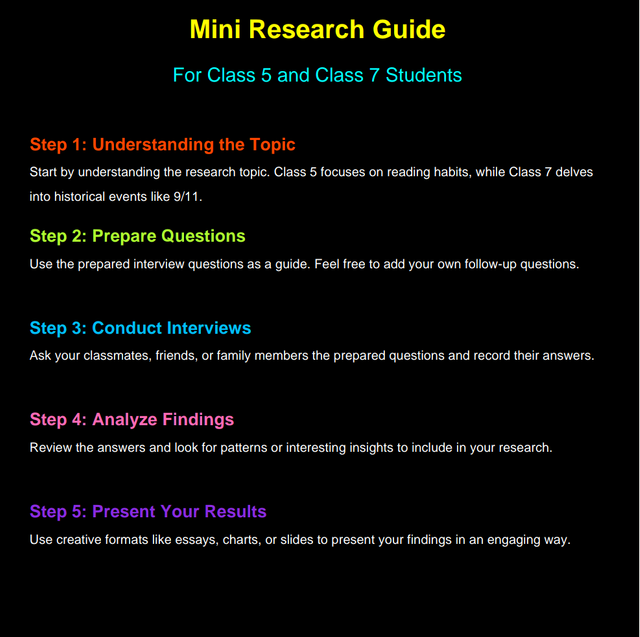 Throughout my research priority Throughout my research priority |
|---|
From close observation of the students' activities during their research, a number of weaknesses emerged that can be addressed to improve their skills:
Framing Questions: Most of the students had difficulties in framing meaningful follow-up questions during interviews. Although they followed the prepared questions, they hesitated to dig deeper when responses evoked new ideas.
Limited analytical thinking: Most students lacked the capacity to relate findings to larger ideas or to bring forth intelligent insights. Instead, for example, they provided plain facts without clarifying the implication of those facts.
Inadequate time management: A couple of students concentrated too much on one specific aspect, for instance interviews, but by the time they get there, time runs out and they either cannot go through their findings or lack the time for presentation.
Overreliance on Support: Many students often asked for confirmation or validation of their next course of action, which is a sign of a loss of confidence in the students' ability to manage research on their own.
Shallow Insights: Some students have only looked at the manifest features without digging deeper for causes or effects. For example, class 5th students pointed out the favorite genres of books without exploring why those genres might be appealing to their classmates.
Steps towards Development Analytical Skills
The said weaknesses and enhancing the thought process of analyzing must, therefore, lead me to develop the following strategies for building analytical thinking:
Practice ; Asking the Right Question Conduct practice sessions with a set of hypothetical scenarios so that these students learn the depth questions during interviews or even later on by conducting follow-up enquiries.
Analysis Exercises: Provide tasks where students interpret data or case studies. For example, they could analyze a short story for hidden themes or compare two historical events to find similarities and differences.
Time Management Training: Provide classroom activities that include timed tasks to help students learn to allocate their time across all stages of a project.
Independence: Gradually reduce the amount of guidance provided during research tasks. Assign smaller independent projects that allow them to explore topics on their own before doing group research.
Critical Thinking Challenges: Use puzzles, debates, and open-ended discussions that require them to think critically and defend their ideas with logical reasoning.
Structured Reflection: Following each research activity, I will have students reflect on their process by answering questions such as, "What could I have done better?" or "What was the most challenging part of this task?"
By implementing these strategies, I will continue to build their analytical skills and make them confident, independent thinkers in future research activities.
I am inviting my friends @sur-riti, @lvric, @sualeha to participate in this contest. Thank you for reading .
Best Regards,
artist1111
@tipu curate
Thanks for invite me in this contest, I will definitely try to participate soon.